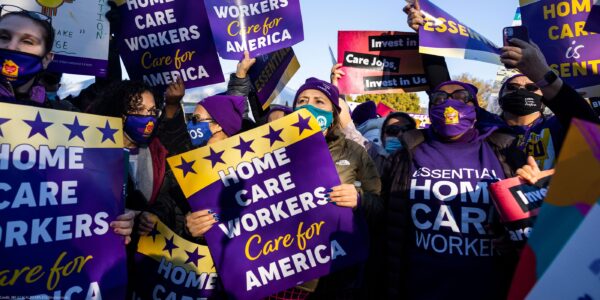ACLU Opposes Department of Labor’s Proposal to Strip Wage Protections from Home Care Workers
WASHINGTON — The American Civil Liberties Union has filed a public comment opposing the Department of Labor’s (DOL) proposed rule, “Application of the Fair Labor Standards Act to Domestic Service,” which would eliminate hard-won wage and hour protections for millions of the nation’s paid caregivers, who are disproportionately Black and Brown women and are among the poorest workers in the labor force.
The proposal would change the definition of in-home “companionship” services under the Fair Labor Standards Act (FLSA), the federal law whose protections include a minimum hourly wage and overtime pay for work performed beyond 8 hours in a single day, or 40 hours in a single week. Under the proposed new definition, millions of home care workers would no longer be entitled to those protections. Additionally, while agencies and other third-party employers of home care workers currently are required to comply with the FLSA, DOL proposes to excuse those employers from the statute’s requirements. These actions would undo DOL’s 2013 regulations, which extended FLSA protections to home care workers after decades of exclusion.
“Even though they currently are entitled to receive the minimum wage and overtime, home care workers are among the most vulnerable in our nation’s labor force, facing wage theft and unsafe working conditions, and living in poverty,” said Gillian Thomas, senior counsel in the ACLU Women's Rights Project. “The Department of Labor ’s proposed rule change would strip away the meager economic security that FLSA coverage provides to these essential workers, who take care of our elders and our loved ones with disabilities. By enabling greater exploitation by corporate home care providers, DOL will drive more workers out of a field already facing a profound labor shortage and deprive millions of families of the care they rely on.”
ACLU’s comment highlights that the exclusion of home care workers from the FLSA’s protections stems directly from the legacy of slavery and Jim Crow. When Congress passed labor laws like FLSA and the Social Security Act in the 1930s, lawmakers carved out from those statutes’ coverage domestic workers as well as agricultural workers—the two fields in which formerly enslaved people and their descendants were most likely to work—in order to win southern lawmakers’ support. Although Congress eventually amended the FLSA to bring such workers within the law’s protection, DOL did not fully effectuate that intent until it issued regulations in 2013.
“Today, home care workers still are disproportionately women of color, and most of whom are women and people of color, provide essential care yet remain among the poorest and least protected in our economy. Rescinding DOL’s 2013 rules not only will make them much poorer—it will shamefully revive a legal exclusion firmly rooted in racism and misogyny,” added Thomas.
DOL’s 2013 rule recognized the realities of the modern home care industry, in which workers are well-trained professionals who are supporting families of their own, and in which third-party agencies—rather than care recipients themselves—employ care workers, reaping billions in profits. Entitlement to minimum wage and overtime pay has provided economic security for a workforce made up overwhelmingly of women, and particularly Black women and immigrant women. Such protections not only have helped lift wages for one of the nation’s lowest-paid professions, but also has ensured stable, quality care for seniors and people with disabilities.
ACLU’s comment further explains that the proposed rule violates the Administrative Procedure Act. DOL has effectively suspended the 2013 rule without proper notice and comment, and its justifications for abandoning longstanding protections are arbitrary, capricious, and unlawful.
The ACLU urges the department to preserve the 2013 rule, which corrected a historic injustice, advanced gender and racial equity, and strengthened the home care workforce.
The full comment is available here.






